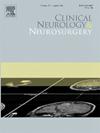Impact of perioperative nutritional supplementation on outcomes of spine surgery: A systematic review and meta-analysis
IF 1.8
4区 医学
Q3 CLINICAL NEUROLOGY
引用次数: 0
Abstract
Objective
Malnutrition, characterized by a total serum lymphocyte count less than 1500 cells/mm³ and serum albumin levels below 3.5 g/dL, is linked to delayed wound healing and a higher incidence of surgical site infections (SSIs). This meta-analysis evaluates the impact of perioperative nutritional supplementation on clinical outcomes in spine surgery.
Methods
A systematic review of the published literature was conducted. Outcomes of interest included postoperative complications such as wound complications, SSI, and deep vein thrombosis (DVT). Estimated blood loss, operative time, and duration of hospital stay were also investigated.
Results
Five studies with 554 patients were included. A total of 221 patients (39.90 %) were in the intervention group, compared to 333 patients (60.10 %) in the control group. The intervention groups received nutritional supplementation at different timeframes, including preoperatively or postoperatively. A significantly lower rate of total complications (OR: 0.32, CI: [0.12, 0.89], p = 0.04) and wound-related complications (OR: 0.34, CI: [0.20, 0.60], p < 0.01) was observed in the intervention group when compared to the control group. A trend towards fewer SSIs was observed (OR: 0.35, CI: [0.02, 7.19], p = 0.39). There were also fewer DVT events in the intervention group (OR: 0.62, CI: [0.04, 8.90], p = 0.52).
Conclusions
Patients receiving perioperative nutritional supplementation had significantly lower overall and wound-related complication rates compared to patients who did not receive nutritional supplementation perioperatively. This analysis highlights the value of nutritional supplementation as part of the perioperative care and optimization efforts in patients undergoing spine surgery.
围手术期营养补充对脊柱手术预后的影响:一项系统回顾和荟萃分析
营养不良的特点是血清淋巴细胞总数低于1500个/mm³ ,血清白蛋白水平低于3.5 g/dL,这与伤口愈合延迟和手术部位感染(ssi)发生率较高有关。本荟萃分析评估了围手术期营养补充对脊柱外科临床结果的影响。方法对已发表的文献进行系统回顾。结果包括术后并发症,如伤口并发症、SSI和深静脉血栓形成(DVT)。估计失血量、手术时间和住院时间也进行了调查。结果纳入5项研究,554例患者。干预组221例(39.90 %),对照组333例(60.10 %)。干预组在术前或术后的不同时间段里接受营养补充。干预组总并发症发生率(OR: 0.32, CI: [0.12, 0.89], p = 0.04)和伤口相关并发症发生率(OR: 0.34, CI: [0.20, 0.60], p <; 0.01)明显低于对照组。观察到ssi减少的趋势(OR: 0.35, CI: [0.02, 7.19], p = 0.39)。干预组DVT事件也较少(OR: 0.62, CI: [0.04, 8.90], p = 0.52)。结论与未接受营养补充的患者相比,接受围手术期营养补充的患者总体并发症和伤口相关并发症发生率明显降低。该分析强调了营养补充作为脊柱手术患者围手术期护理和优化工作的一部分的价值。
本文章由计算机程序翻译,如有差异,请以英文原文为准。
求助全文
约1分钟内获得全文
求助全文
来源期刊

Clinical Neurology and Neurosurgery
医学-临床神经学
CiteScore
3.70
自引率
5.30%
发文量
358
审稿时长
46 days
期刊介绍:
Clinical Neurology and Neurosurgery is devoted to publishing papers and reports on the clinical aspects of neurology and neurosurgery. It is an international forum for papers of high scientific standard that are of interest to Neurologists and Neurosurgeons world-wide.
 求助内容:
求助内容: 应助结果提醒方式:
应助结果提醒方式:


